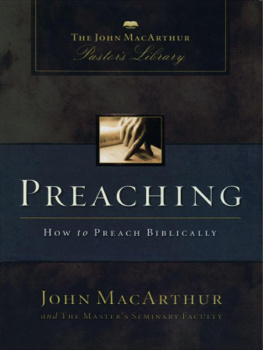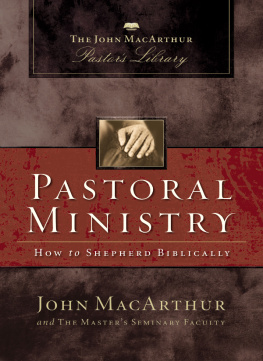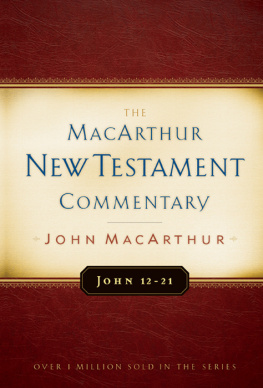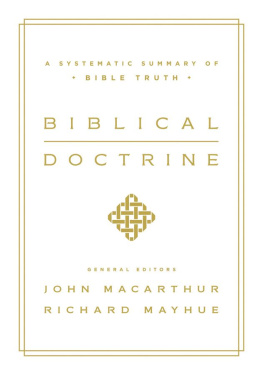Copyright 1997 by John F. MacArthur, Jr.
All rights reserved. No part of this publication may be reproduced, stored in a retrieval system or transmitted in any form by any means, electronic, mechanical, photocopy, recording, or otherwise, without the prior permission of the publisher, except as provided by USA copyright law.
F. MacArthur, Jr.
p. cm.
Includes index.
1. IntegrityReligious aspectsChristianity. I. Title.
W e live in a world of compromisein a society that has abandoned moral standards and Christian principles in favor of expediency or pragmatism. The underlying philosophy is based on accomplishing goals by whatever means are necessary. This self-centered perspective should have as its motto: If it works for you, do ita notion that inevitably leads to compromise of conscience and convictions. Because compromise is so prevalent in our society, you could say we no longer have a national conscience; guilt and remorse are nonfactors in determining behavior.
Politicians, who should be upholding the high ideals of our country, instead are leading the way in compromise. They promote their lofty standards and high ideals prior to their elections but compromise them once they are in office. The same holds true in business, from corporate executives down to salespeople; in the courts, from judges to attorneys; in sports, from owners to athletes; and in all walks of life. As a result, people learn to lie, cheat, steal, and shade the truthto do whatever is necessary to get what they want. Thus compromise becomes a way of life.
Unfortunately, the philosophy and practice of compromise has even invaded the church. Because tolerance is the operative ideology in our society, the church adopts a similar perspective to reach the unsaved. Many churches now look for ways to give the Gospel to people without offending them. Yet the very nature of the Gospel is offensive because it confronts sinners with their sin. Ignoring that, many churches willingly compromise Gods Word instead of standing firm on the Gospel, and they give the world a watered-down version that cant effect any change.
On an individual basis, the spirit of compromise hits closer to home in your personal interactions. You may have had opportunities to proclaim Christ to unbelievers, yet out of intimidation or lack of confidence, you have kept silent. Perhaps youve found yourself compromising Gods Word on some ethical issue at work or in your neighborhood and convinced yourself that such compromise was necessary to maintain your credibility as an employee or neighbor. Yet your Christian testimony is predicated on your complete devotion to Gods Word as the highest authorityno matter what the consequences may be. God draws the elect into the kingdom through Christians who prove to be different from the worldwho reveal their true allegiance by their commitment and obedience to Gods standards.
Our difficulty in living like that is the opposition we encounter from the world. R.C. Sproul, in his book Pleasing God, describes the pull the world has on us:
The world is a seducer. It seeks to attract our attention and our devotion. It remains so close at hand, so visible, so enticing. It eclipses our view of heaven. What is seen vies for our attention. It entices our eyes lest we look up for a better country whose builder and maker is God. It pleases usmuch of the time, anywayand, alas, we often live our lives to please it. And that is where conflict ensues, for pleasing the world so seldom overlaps with pleasing God.
The divine call we receive is this: Do not be conformed to this world (Rom. 12:2). But the world wants us to be partners with it. We are urged to participate in the fullness of it. It presses upon us with the ultimate peer pressure. ([Wheaton, Ill.: Tyndale House, 1988], 59)
The church is now so adept at compromising with the world that it has forgotten how to be uncompromising. Thats because we readily accept the worlds value systems and indulge ourselves in them to the point that we personalize them and they become our desires. In essence our standards replace Gods.
Scripture calls us to the opposite of compromise. From one end of the Bible to the other, God clearly commands his people to live apart from the world.
When God established the nation Israel, He built into the Israelites daily living the principle of separation from the world. Their religious observances throughout the year served as safeguards to prevent them, as a unique people (Deut. 14:2), from intermingling with pagans.
Likewise, God calls all His people to be separate from the world (1 Pet. 2:9). Whenever we are tempted to compromise, we need only remind ourselves that God never compromises His absolute truths and principles for expediency. He always lives according to His Word. Psalm 138:2 says, Thou hast magnified Thy word according to all Thy name. God is committed to His Word, and as His children, we are to be also.
When you view Gods Word as the ultimate authority, that opens the way for developing integrity instead of compromise. The American Heritage Dictionary (Houghton Mifflin, 1992) defines integrity as steadfast adherence to a strict moral or ethical code, the state of being unimpaired; soundness, or the quality or condition of being whole or undivided; completeness. It comes from the word integer, which means whole or complete. Integrity essentially means being true to ones ethical standards, in our case, Gods standards. Its synonyms are honesty, sincerity, incorruptibility. It describes someone without hypocrisy or duplicitysomeone who is completely consistent with his or her stated convictions. A person who lacks integritysomeone who says one thing and does anotheris a hypocrite.
Nowhere is integrity more critical than in the leadership of the church, because the spiritual leader must maintain integrity to set a credible example for all to follow. Yet there are many in leadership who lack integrity and thus by definition are hypocrites.


















